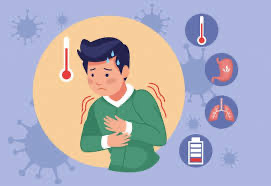Typhoid Fever: A Lifestyle disease?
By Ore Taiwo Makinde.
Is Typhoid Fever Common?
The illness ‘typhoid fever’ is a common diagnosis in our clime. Almost every week, I hear of another person who has been with diagnosed with ‘typhoid’. I however find it interesting that this is usually reported with some sense of relief. As if to say, ‘thankfully it is nothing more than typhoid’. But do we understand what typhoid fever is? My concern is that in this day and age and with technological advancement, our understanding of how to prevent certain diseases appears limited.
I was on call in a busy emergency room when a young boy of 12 years was rushed in looking ill and pale. He had a high fever, was vomiting and was almost prostrate. Speaking with the parents of the child, I discovered that he had been ill for the past 2 weeks. He had been given over the counter medicine which included the ‘red and yellow’ capsule. They had also invited a ‘nurse’ who administered a ‘drip’ on him at home.
However, the illness had worsened before his parents discovered the urgent need to bring him to the hospital. On arrival, we diagnosed that his abdomen was painfully enlarged from a perforation in his intestine. This is a typical sign of damage to the intestine by typhoid fever. We encountered cases of ‘typhoid perforation’ practically every other day while I worked in this semi-urban setting some years ago.
Correct Diagnosis?
The scenarios of ‘typhoid’ that present to me now that I work in a more urban setting are quite unlike this young boy. The patient comes in and tells you that he was diagnosed with typhoid and almost sounds happy with this diagnosis. I then have to ask questions such as, ‘Do you have a fever?’, ‘Are you vomiting?’, ‘Any abdominal pain?’ ‘Are you passing loose stools?’. Most of the time, the answers to these questions are ’No’. With the absence of these symptoms, I begin to wonder, “Is it typhoid fever this patient has?”.

You May Have Eaten Poo!
One of my trainers during my house-job always told his patients in the Yoruba dialect after they recovered from a typhoid illness, ‘If you came down with typhoid fever, it means that you have eaten faeces’. That assertion sounded horrific to me at the time but I realised that his statement was quite apt. This is the scientific fact. Typhoid fever is caused by the bacteria known as Salmonella typhi which is shed in the urine and faeces of infected persons including healthy carriers.
Typhoid Mary
Typhoid infection is as old as Mary Mallon (1869 -1938) who was nicknamed ‘Typhoid Mary’ because of her role in spreading typhoid fever. She was forcefully made to spend 30 years in isolation in the early 1900s as a result.
This was after it was discovered that she was responsible for several outbreaks of typhoid illness as well as deaths in the families where she served as their cook. This was quite unfortunate as she was transmitting the illness to others while she remained completely without symptoms. It was almost impossible to prove that the disease had come from her, but thankfully it was eventually proven. How could this happen?
What causes Typhoid fever?
The reason behind this unbidden spread of the virus was not just because Typhoid Mary was a chronic carrier of the causative bacteria. Rather, it was discovered that she seldom washed her hands! To prevent such recurrences in our day and to ensure that we don’t become the next person to be diagnosed with typhoid fever, here is some useful information to keep at our fingertips:
- The typhoid illness poses a high disease burden with a global estimate of 26.9 million cases in 2010; Africa having an incidence of 10-100 cases per 100,000 annually.
- Typhoid fever is typically transmitted in unsanitary conditions, through contaminated drinking water and food.
- Typhoid fever is a severe illness which can affect all body organs including the brain, the intestines, lungs and the kidneys.
- Those that transmit the disease usually can do so because they have poor hygiene. In other words, they do not wash their hands properly.
- To prevent infection, visit only restaurants or food places with good sanitary conditions. It doesn’t matter how tasty the food is. Are they situated beside an uncovered drainage? Or a refuse dump. Think cholera if they are.
- Do they have a food handlers certificate hanging in the restaurant or eatery? If there is a licensing body monitoring their services, it will be easier to report cases of suspected typhoid illness or food poisoning that stem from there. Besides, properly trained and seasoned caterers would never want to take that risk.
- All chefs or cooks in private or public settings including schools must mandatorily go through a typhoid screening test. They should not be allowed to work in that capacity until they are thoroughly tested and treated.
- Wash all fruits and vegetables thoroughly, either with soap, salt or vinegar depending on the category. Those that require peeling should be washed with soap and water e.g oranges, watermelon, cucumber. It is longer news that some fruit-sellers wash and ripen their wares in drainage channels (gutters).
- Everyone should wash their hands with soap and water before and after cooking, before handling or serving food and water, before and after eating and after using the toilet.
- Don’t patronise quacks when you are ill. This is exemplified by those taking intravenous fluids (drip) at home from those parading as medical professionals without even reaching a proper diagnosis.
- A single widal test is not sufficient to make a diagnosis of typhoid fever despite being being conducted in several laboratories.
- Advocating for access to improved, safe water supply, improved sanitary conditions and typhoid vaccines nationally is key to overcoming the challenge of typhoid fever in African countries.
In conclusion, in case you have ever been diagnosed with typhoid, please be sure you didn’t get the diagnosis because of a single positive widal test which is unreliable. It may just be malaria or even something that requires more urgent attention. Secondly, check your hygiene – environmental hygiene, hand hygiene, toilet hygiene and even your respiratory hygiene (cough etiquette). Is it such a bother to wash your hands or sneeze into your elbow? This is the time to make hygiene a lifestyle habit. In so doing, you can avert typhoid fever and all the complications that come with it.
Dr Ore Taiwo Makinde is Consultant Family Physician and certified Lifestyle Medicine Physician.

9 Comments
Thank you Dr. Ore for this write up.
Which test can we do to determine typhoid fever since widal test is not reliable?
There is another test known as the Typhoid IgG/IgM which will signify whether what you are having is an old or recent Typhoid infection.
Another good test a physician can use is the full blood count.
Chief,the broad spectrum nature of ignorance as regards typhoid and Malaria is alarming. It has become so sad that even as a trained Consultant,if you do not treat people for typhoid and Malaria even when they have florid CKD or other diseases,then you are a quack.things are really so sad.do you know they pass catheter for people,hang infusion,give them Rifampicin to take and tell them their system is been detoxified because of its orange discoloration of the urine. This happens in onitsha.we have a lot to do to right things in Nigeria.People that treat malaria and typhoid are richer than consultants. They even scare them that the typhoid titers are so high and people borrow to take intramuscular injections for days with some developing abscess. It’s pathetic
This is indeed pathetic. Well said, doc. We have so much work to do. God has designed our liver and kidneys to detoxify our system yet we go ahead to replace it with ineffective methods that further compound our problems also leading to antibiotic resistance. Nigerians, please let us wise up!
Thanks so much for this wonderful write up. It has added my exiting body of knowledge. Please, where’s our Government, they aree failing in their responsibility. Sanitary officer are no where to be found and where they are visible, they compromised in the course of performing their responsibility. Ignorance are killing people, poverty are killing people. It is highly time our leaders, Government, traditional rulers and Religion leaders who wake up to their statutory responsibility. Go to Government hospital, Notting to write home about, no basic drugs, amenities are lacking and poor remuneration if at all there is any to mention but few. I think much more orientation by concerned authorities through print media, electronic media and what have to start with and with prayers, God we save our souls. Thanks. God bless you ma
We do need a concerted efforts from all tiers of government to ensure good sanitary conditions. We also need more enforcement of sanitary regulations. Although knowledge is power, it must be applied to be effectual. We won’t stop the advocacy.
Thank you Ma. May God help us to make hygiene a lifestyle habit.
Thanks for this educative write up Doc!
Comments are closed.